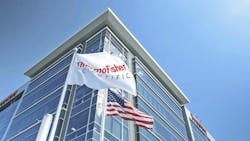Thermo Fisher CEO says Most Favored Nation and tariff policies are better than feared
Despite recent uncertainty in the biopharma industry, Thermo Fisher Scientific CEO Marc Casper believes there’s a “quiet confidence” among pharmaceutical and biotechnology customers that they will “be able to navigate” the Trump administration’s Most Favored Nation (MFN) drug pricing framework and the threat of pharma-specific tariffs.
“You’re seeing that in some of the announcements that have been made on pricing, as well as on reshoring more [R&D and manufacturing] activity in the U.S. in terms of not being exposed to potential tariffs,” Casper told analysts on Wednesday during Thermo Fisher’s third-quarter 2025 earnings call.
On Sept. 30, Pfizer announced an agreement to lower prescription drug prices, while securing for the drugmaker a three-year grace period from the Department of Commerce’s Section 232 investigation on pharma tariffs and pledging a $70 billion investment in U.S. R&D and manufacturing.
On Oct. 10, AstraZeneca announced a similar deal with the Trump administration to lower the cost of U.S. prescription drugs, while also securing a three-year reprieve for its products from pharma tariffs under the Section 232 investigation. The drugmaker previously committed to investing $50 billion in U.S. manufacturing and R&D.
Since the start of 2025, large biopharma companies have announced investments in U.S. R&D and manufacturing infrastructure totaling hundreds of billions of dollars.
Casper on Wednesday said Thermo Fisher is “very engaged in helping those customers think about new sites, how to best equip them, and support our customers in that effort.” As a result, he contends that the incremental tariff/MFN-related U.S. investment in “new construction” will ultimately benefit Thermo Fisher’s analytical instruments, bioproduction, and channel businesses.
“That’s really largely 2027-2028 by the time ground is broken on new things,” Casper told analysts. “For expansions within existing facilities, it could be a little bit faster than that. That is something we’re actively engaged in, but it takes some time to gestate. More rapidly than that, and in a way more cost-effectively for our customers, is leveraging our pharma services network to be able to move more of their volume to the U.S.”
Acquisitions take shape
In July, Thermo Fisher announced it was buying Sanofi’s sterile drug product manufacturing facility in Ridgefield, New Jersey for an undisclosed amount, expanding its strategic partnership with the French drugmaker to enable additional production capacity in the U.S. The Ridgefield site, now part of Thermo Fisher’s pharma services business, specializes in fill‑finish and packaging of aseptic injectable medications.
“Our arrangement with Sanofi, where we acquired one of their sites, gives us another production node in the U.S. that is well-trained, great workforce, and the ability to expand that facility as well,” Casper said. “We’ll continue to manufacture a portfolio of Sanofi’s therapies, and we’ll invest in additional production lines to meet the growing demand for U.S. manufacturing from our pharma and biotech customers as they reshore more activity to the U.S.”
In April, Thermo Fisher announced it was making a $2 billion commitment to U.S. manufacturing and R&D over the next four years. Of that amount, $1.5 billion is earmarked for capital expenditures to enhance and expand manufacturing. The company is also expanding sterile fill-finish capabilities at its Greenville, North Carolina site.
Thermo Fisher in February paid $4.1 billion in cash to buy Solventum’s purification and filtration business, whose technologies are used in the development and manufacturing of biologics, spanning upstream and downstream workflows.
“We completed our acquisition of our filtration and separation business from Solventum, which is now part of our life sciences solutions segment,” Casper said, noting that the integration is progressing smoothly. “This business expands our bioprocessing offering for pharma and biotech, as well as industrial filtration capabilities.”
About the Author
Greg Slabodkin
Editor in Chief
As Editor in Chief, Greg oversees all aspects of planning, managing and producing the content for Pharma Manufacturing’s print magazines, website, digital products, and in-person events, as well as the daily operations of its editorial team.
For more than 20 years, Greg has covered the healthcare, life sciences, and medical device industries for several trade publications. He is the recipient of a Post-Newsweek Business Information Editorial Excellence Award for his news reporting and a Gold Award for Best Case Study from the American Society of Healthcare Publication Editors. In addition, Greg is a Healthcare Fellow from the Society for Advancing Business Editing and Writing.
When not covering the pharma manufacturing industry, he is an avid Buffalo Bills football fan, likes to kayak and plays guitar.
